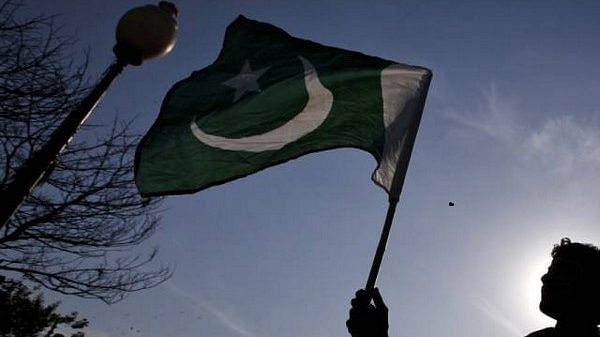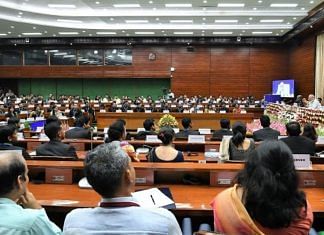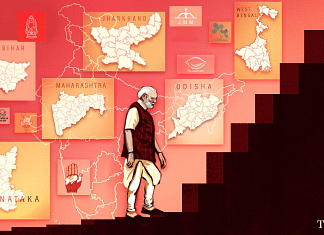Thank you dear subscribers, we are overwhelmed with your response.
Your Turn is a unique section from ThePrint featuring points of view from its subscribers. If you are a subscriber, have a point of view, please send it to us. If not, do subscribe here: https://theprint.in/
Pakistan will remain to be a dysfunctional state for the foreseeable future, challenged by economic stresses and home-grown security issues. While it has become imperative to assess the implications for India, it is important to look at the rear-view mirror to have a second look as to how Pakistan reached this stage.
To comprehend the enormity of the question, I reproduce below some excerpts about the fears of India, post 1962, regarding the Sino-Pakistan alliance and recent quotes from Pakistan’s Prime Minister and commentators.
{Written pamphlet entitled Partners in Aggression by Radha Kamal Ghosh, in which one quote is reproduced from the book Kashmir a Study in India-Pakistan relations by Sisir Gupta. This material was also published as articles in Amrita Bazar Patrika, 15 and 20 September 1963.}
[Quote][Para 3] India has finally the benefit of knowing what Pakistan wants from India. It is not Kashmir as much as the early “disintegration of India into a motley State.” Bhutto’s analysis of India’s situation agrees with that of his new friends in Peking. The Chinese believe that their last attack on India and the fear of it happening again have set up a catalytic process which will bring about the down fall of the present political leadership and breakup India into a motley State. They too, are awaiting these developments, “with patience.” Both China and Pakistan realize that they have to combine their resources and influences to hasten these dire prognostications. [Unquote]
Let us now fast forward to January 17, 2023. The present Prime Minister of Pakistan, Shehbaz Sharif, had said in a television interview: [Quote] “We are both nuclear powers armed to the teeth…. God forbid…” [Unquote]
Now, I would like to reproduce a quote from an article published on January 24, 2023 “India’s coming of age” by Mosharraf Zaidi.
[Quote] Pakistan, even at its most pathetic – like when making last week’s inexplicable and random appeal for dialogue with India – is the sharp end of resistance to both. This is neither a moral nor an ideological proposition. Nor is it a call to arms, or a demand for a deepening or widening of Pakistan’s already unwieldy allocation of national effort to countering India. It is however a strategic and political compulsion: Pakistan must learn how to recognize India’s achievements with the rest of the world, whilst defending itself and its core interests. These interests include resisting Indian hegemony in the neighbourhood, managing India’s attempts to unilaterally alter the status quo in the South and Central Asia region, defending against India’s ideological commitment to Hindu supremacy, and exposing India’s brutal occupation of Kashmir.[Unquote]
The quotes reflect the Indian apprehension of the collusion of the vassal state Pakistan with China, their ultimate objectives, and the recent interviews/thoughts which illustrates the use of blackmail by nuclear overhang and the mindset of commentators. Nothing tangible has changed in the last 75 years, with a dominant military, protecting against a constant arch rival India, funding terrorists to harm India on the pretext of Kashmir, and the economic boom-and-bust cycle, backed by western powers and China.
India’s choices:
The predicament that Pakistan is in; is a “DO NOTHING” scenario for us. The Minister of External Affairs, S. Jaishankar, in a recent interview; enunciated a pragmatic approach, that the present chaos, is Pakistan’s doing, it, itself, has to find ways to get out of this difficult situation.
India will be hosting important events this year; as president of the Shanghai Cooperation Organisation (SCO)- the foreign ministers meeting in Goa likely in July and the G20 summit in September 2023. India needs to be on its highest guard, since inimical elements in Pakistan and other actors in the ecosystem, will try to discredit India. The following year – 2024, crucial general elections are going to be conducted, which will have a critical bearing on the Narendra Modi government, the BJP, and the future course of India.
For India’s sake and for the BJP party, it would be well advised to formulate a succession planning in advance, so that the focus from Prime Minister Narendra Modi is diffused. It has been acknowledged by political analyst in Pakistan that Modi has “done something to brand India which none before him was able to manage [Shahzad Chaudhry].” This view, while valued, is also fraught with danger, that if the Modi government is defeated in the polls or reduced to a minority, the progress of India could be halted.
While the future looks bright for aspirational India, which also seeks to be a Vishwa Guru; a reformer and teacher for the entire world; imbalances in the neighbourhood, mainly from Pakistan, and internal dissensions within the country, needs to be managed astutely.
These pieces are being published as they have been received – they have not been edited/fact-checked by ThePrint.









COMMENTS